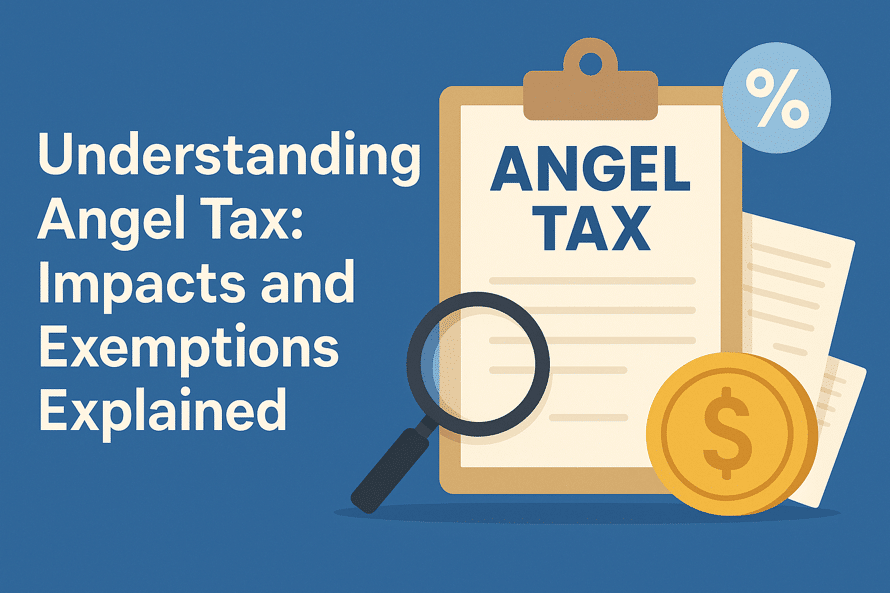Understanding Angel Tax: Impact and exemptions explained

New businesses need money for growth. To meet these needs, they get money from seed investors. However, the money you raise from angel investors at a higher valuation is taxable under the Income Tax Act. This is called angel tax.
There has been much talk about angel tax in India’s startup scene. It changes how startups get money, which can be tough for entrepreneurs who want to start their own businesses. Keep reading to learn more about angel tax in detail.
What is angel tax?
Unlisted companies that raise funds from angel investors by issuing shares are liable to pay angel tax. Companies with strong profitability and promising business prospects typically sell stakes at a higher valuation to angel investors. The firms refer to the additional amount as income from other sources.
Definition and overview
The tax that angel investors pay on investments in new businesses when the amount invested is more than the business’s fair market value (FMV) is called angel tax. Section 56(2) (viib) of the Income Tax Act, 1961, contains provisions governing angel tax. It became effective in 2012 to prevent fraudulent funds from flooding startups by inflating their values. However, company owners and investors are concerned about how it will affect early-stage funds.
Unlisted businesses that raise capital from investors are subject to angel tax. The tax authorities tax the extra investment beyond the FMV as income from other sources. This tax may discourage investments, impacting startup growth and ecosystem innovation.
Origin and purpose in India
Angel tax is a way to stop illegal money from entering the market through high-value startup funding. Since its introduction in 2012, the government’s main goal has been to prevent individuals and startups from evading taxes.
Angel tax, which started as a good idea, ended up being controversial. Many startups faced significant challenges as they committed to their investments. It frequently became a bone of contention between the investor and the tax officials in the evaluation space. Angel investors expressed concerns regarding the tax implications, with their worries centered on the possibility that the new companies they invested in could be valued higher than their actual worth.
Impact of angel tax on startups and investors
The primary goal of angel tax was to prevent money laundering, which involves presenting illicit funds as legitimate business capital. However, while authorities pursued wrongdoers, many legitimate entrepreneurs and sincere investors were caught in these regulations.
1. Financial burden on young companies
As a new entrepreneur, picture yourself attempting to collect money for your ideal project. A hefty tax bill appears out of nowhere because the government believes you overpriced your shares.
For startups, these are some real effects:
– Reduces funding options
When people think that a company might be hit with heavy taxes in the future, they are less likely to invest in it. No one wants to get into trouble for attempting to assist in a company’s expansion. This means there is less money for developing new business ideas.
– Problems with cash flow
As a general rule, startups are always in need of cash. While they are paying angel tax, their operating cash may decrease. This makes it difficult for them to hire good people, create new products, or invest in marketing and growth efforts.
– Discouragement of high valuation
Startups sometimes have great ideas or a lot of promise for the future. People who want to buy a piece of the business might be ready to pay more. But angel tax stops people from doing this, which causes startups to undervalue themselves to escape tax problems.
2. Influence on investor confidence
Till now, the Income Tax Department has sent Angel tax notices to more than 73% of startups in India that raised between Rs 50 lakh and Rs 2 crore, according to this news report. Like startups, angel investors—those who put their money into start-up businesses—are also impacted.
– Greater uncertainty for investors
When people invest in new businesses, they take a lot of risk. Taxing their investment as income for the company complicates things too much. Some investors may decide not to invest in new businesses because of this tax. Instead, they may choose alternative investments like stocks or mutual funds.
– Lower angel investing culture
India needs a robust culture of angel financing to encourage the development of new firms and ideas. Angel tax, on the other hand, causes investors to reconsider their investment decisions, which is detrimental to the overall development of the startup economy.
Exemption criteria for angel tax
Taxing the additional premium on share value is problematic since it would discourage angel investors from backing companies. However, the rules and regulations regarding angel tax may vary from one nation to another.
Additionally, the term may refer to any tax on investment earnings or income from angel investing in a more general sense. For correct and up-to-date information, you should always check the tax laws in the country you are considering.
Qualifying conditions for startups
According to Section 56 (2)(vii)(b), the following steps must be taken to avail a startup tax exemption:
- Recognition of Startups: For a company to obtain an angel tax exemption, the Department for Promotion of Industry and Internal Trade (DPIIT) must recognize its eligibility. They bestow this honor based on various criteria, including the nature of the enterprise, originality, and the development of new goods and services.
- Limit on Turnover: Before the startup received the angel investment, the company’s revenue must have been no more than Rs. 25 crore in the fiscal year preceding the investment.
- Technology and New Ideas: Innovation in intellectual property or technology should drive the startup’s product, process, or service development, implementation, or commercialization efforts.
- Requirements for Angel Investors: In most circumstances, the exemption is extended when a designated group invests in angel investors. Angel investors often have standards, like a certain amount of money to invest or a specific rate of return they’re looking for.
- Fair Market Value: The relevant tax authorities must receive a valuation report detailing the startup’s worth based on the suggested approach.
- Request for Exemption: The Inter-Ministerial Board of Certification will grant an angel tax exemption if the company and its investors submit a request. Startups must also submit supporting documents and information as part of the application process.
Documentation and compliance requirements
The following are the documentation and compliance requirements to get exemptions from taxes:
- Certificate for Startup Recognition: The Department for Promotion of Industry and Internal Trade (DPIIT) should approve that the startup in which the investment is made is a valid startup. The company needs to get a recognition certificate from DPIIT.
- Valuation Report: A registered valuer must assist in preparing the startup’s valuation report. The facts in this report should be used to determine the fair market value of the shares given to the angel investor. The number needs to be filled in following the instructions provided.
- Investment Agreement: With a clear and legally binding investment agreement, angel investors and startups can protect each other’s interests. This contract must include the terms and conditions of the investment, such as the quantity of shares issued, the appraisal, and any other relevant details.
- Inter-ministerial Board Submission: The Inter-Ministerial Board of Certification must receive official requests from the company and the investors to grant an exemption from taxation. You should include any relevant documentation, such as the value report and the startup recognition certificate, with your application.
- Self-Declaration: A self-declaration stating that the investor satisfies the conditions may be required to be eligible for the tax exemption.
- Obeying Section 56(2)(viib): This part of the Income and Capital Gains Act details how to handle angel investments. To qualify for the exemption, the company and the investor must ensure that the conditions outlined in this section are fulfilled.
- Filings for Income Tax: The angel investor must include details about the payment in their income tax returns. This is necessary for transparency and compliance with tax laws.
Conclusion
Angel tax is essential for preventing money laundering and ensuring fair valuation. Despite its importance, its implementation has been difficult. Startups typically face valuation disagreements and international investment issues.
Exemptions and continuous regulatory revisions try to balance these obstacles, creating a fair and transparent startup investment environment in India. Angel tax policies will undoubtedly change as the government balances financial crime prevention with startup ecosystem growth. Startups must grasp the tax consequences and take steps to comply while obtaining funding to expand their business.
FAQs
Q. How does angel tax differ from other forms of taxation?
Angel tax is different from other types of taxation as it targets investments in new businesses and taxes funds raised above their fair market value. Regular taxes apply to all companies’ income, profits, or trades.
Q. What steps can startups take to qualify for angel tax exemptions?
Startups can obtain angel tax exemption by securing DPIIT recognition. They must ensure their total paid-up capital remains below ₹25 crore, acquire a value report, and refrain from investing in specific non-business assets for seven years following the angel investment.
Disclaimer
The stocks mentioned in this article are not recommendations. Please conduct your own research and due diligence before investing. Investment in securities market are subject to market risks, read all the related documents carefully before investing. Please read the Risk Disclosure documents carefully before investing in Equity Shares, Derivatives, Mutual fund, and/or other instruments traded on the Stock Exchanges. As investments are subject to market risks and price fluctuation risk, there is no assurance or guarantee that the investment objectives shall be achieved. Lemonn (Formerly known as NU Investors Technologies Pvt. Ltd) do not guarantee any assured returns on any investments. Past performance of securities/instruments is not indicative of their future performance.







